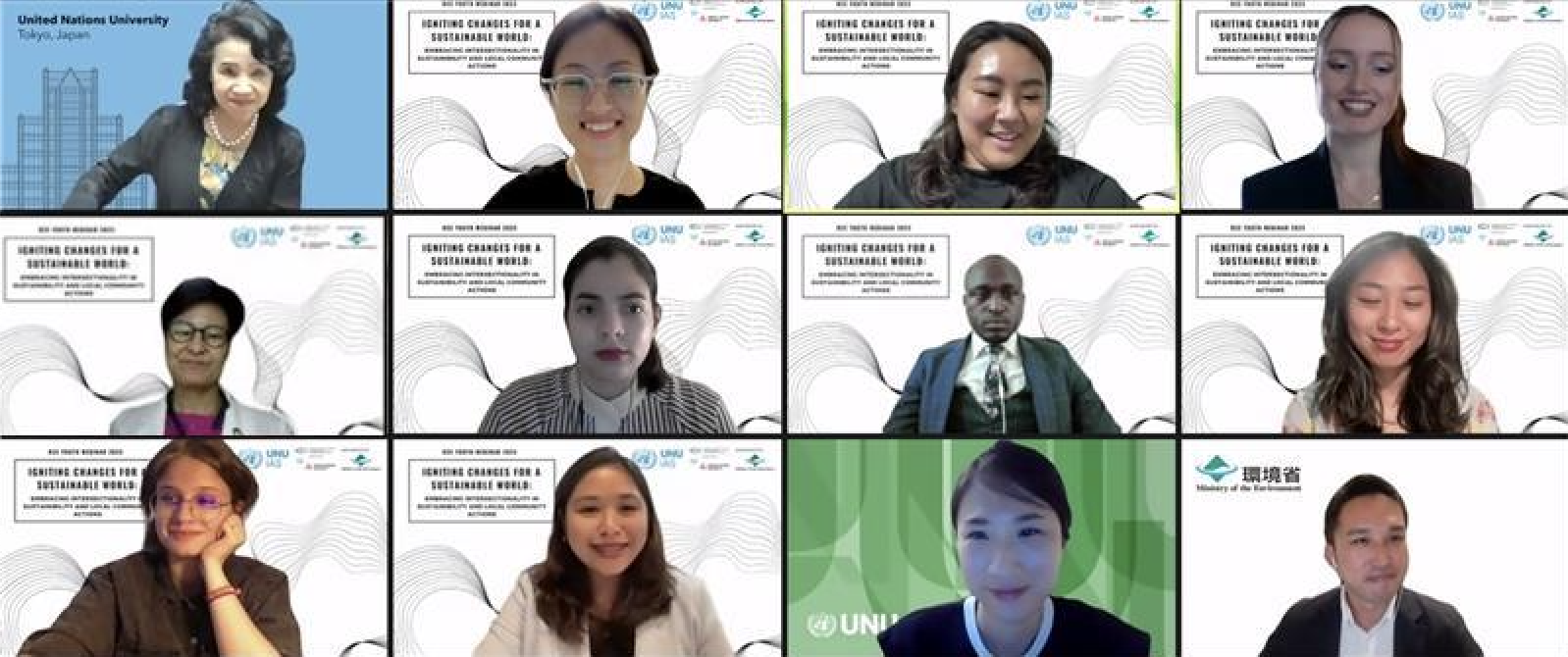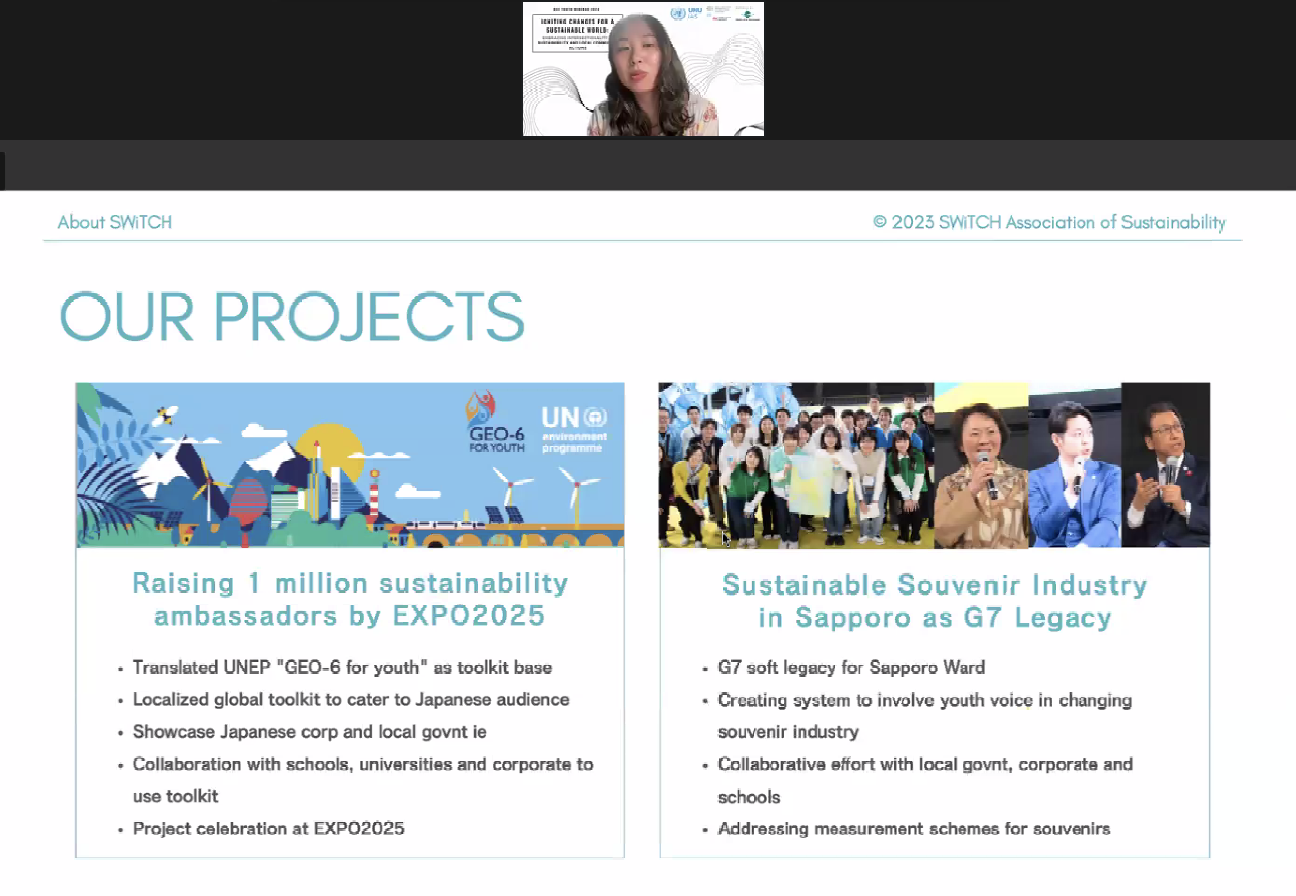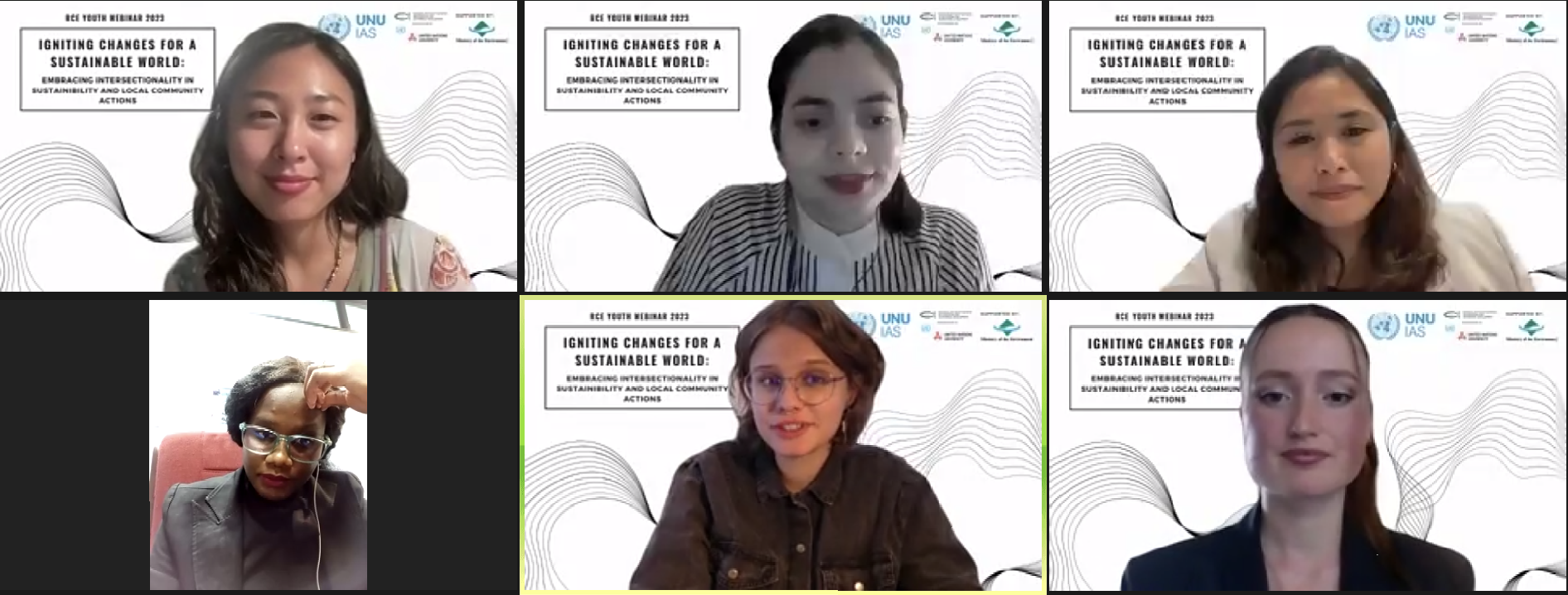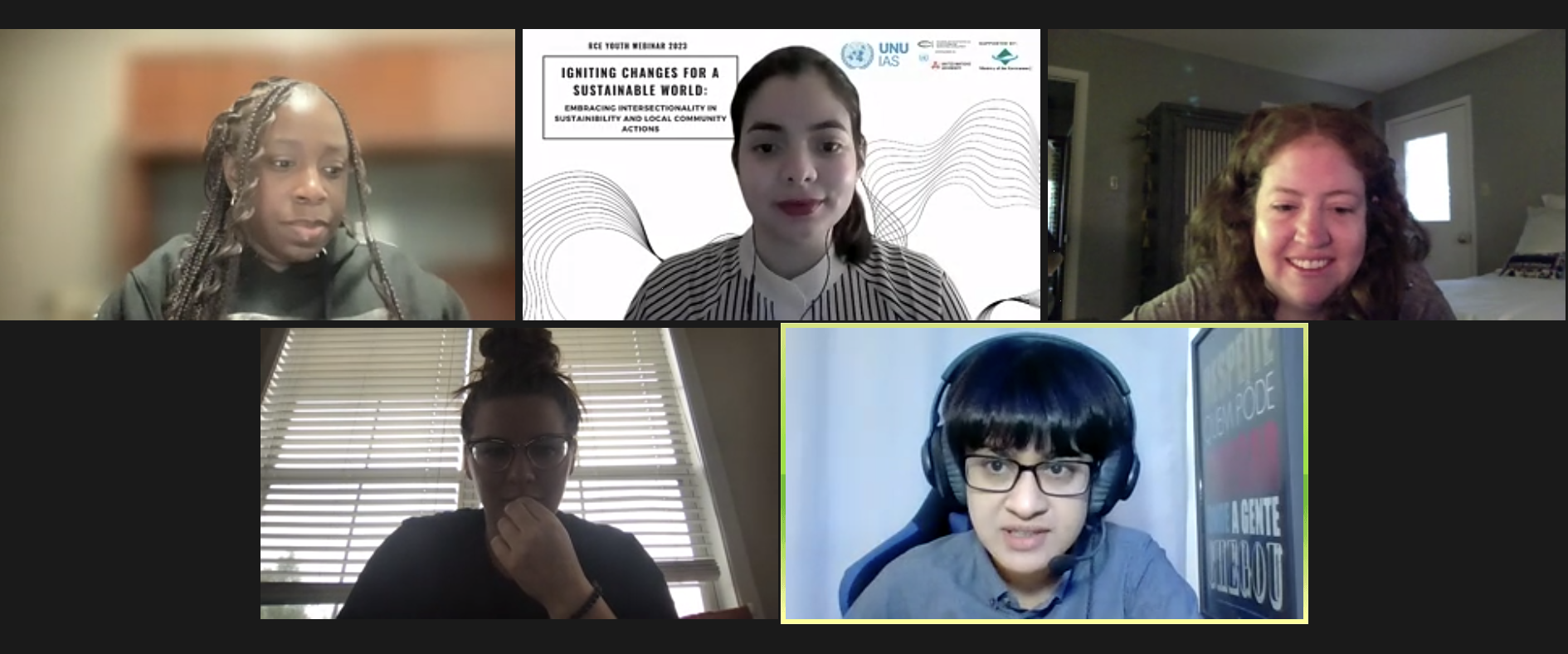RCE Youth Webinar Spotlights Youth's Pivotal Role and Innovative Community Actions Towards a Sustainable Future
Highlights
- The third RCE Youth Webinar was held on 10 August 2023 to celebrate International Youth Day 2023.
- Keynote speakers examined the role of youth in climate action and the role of intersectionality in sustainability.
- Breakout sessions showcased local community actions with presentations given by each of the Regional Youth Coordinators and RCE youth members.
- Examples highlighted innovative undertakings by youth in various areas of sustainability, and demonstrated their driving force in creating substantial change.
 On 10 August 2023, the RCE Youth Webinar was held under the theme 'Igniting Changes for a Sustainable World: Embracing Intersectionality in Sustainability and Local Community Actions', to celebrate International Youth Day 2023. Organised by Regional Youth Coordinators (RYCs), and co-hosted by the Global RCE Service Centre at UNU-IAS, the event brought together 116 participants from around the world, and focused on youth-led initiatives, achieving sustainability, and employing local community actions.
On 10 August 2023, the RCE Youth Webinar was held under the theme 'Igniting Changes for a Sustainable World: Embracing Intersectionality in Sustainability and Local Community Actions', to celebrate International Youth Day 2023. Organised by Regional Youth Coordinators (RYCs), and co-hosted by the Global RCE Service Centre at UNU-IAS, the event brought together 116 participants from around the world, and focused on youth-led initiatives, achieving sustainability, and employing local community actions.
In opening remarks, Shinobu Yume Yamaguchi (Director, UNU-IAS) highlighted the importance of creating an environment where youth can unleash their creativity and full potential, in order to contribute to a fundamental social transformation towards a sustainable future. She encouraged RCE youth to use platforms such as the webinar to collaborate and share their initiatives and plans in their respective regions and beyond.
Keisuke Midori (Section Chief, Ministry’s Secretariat, Office of Environmental Education, Ministry of the Environment of Japan) stressed the importance of ESD in addressing the numerous environmental challenges the world is facing, and acknowledged the role of youth in harnessing wisdom across regions via partnerships, and channelling it into action to achieve the SDGs.
 A keynote by Mana Saza (Director, SWiTCH) examined the role of youth in climate action. The Mock COP26 project which she initiated – a gathering of young minds from over 20 countries advocating for climate education for youth – gained significant momentum as the international community rallied behind the petition to introduce climate education into school curricula, demonstrating the power of youth voices in shaping policies.
A keynote by Mana Saza (Director, SWiTCH) examined the role of youth in climate action. The Mock COP26 project which she initiated – a gathering of young minds from over 20 countries advocating for climate education for youth – gained significant momentum as the international community rallied behind the petition to introduce climate education into school curricula, demonstrating the power of youth voices in shaping policies.
Observing a growing fascination with climate issues among a smaller population of young individuals, Ms. Saza identified the potential to spark lasting change, resulting in the launch of the Project Sustainable Ambassador Program, which focuses on nurturing sustainable practices in youth by involving them in policy-making processes. Reflecting on her journey, Ms. Saza highlighted the importance of having a bold vision, setting ambitious goals, building a supportive network, positivity and resilience, and empowerment through education.
The second keynote by Angel Marie Ysik (Philippines Campaigner, Environmental Justice Foundation) explored the role of intersectionality in sustainability, and how it can help us understand different aspects of how our identity interacts and converges to shape our experiences. Ms. Ysik uses intersectional methods to develop projects, conduct research and training, and to organise community activities. She explained the focus of her current research – on forced labour and human trafficking at sea – identifying systemic problems, and her work investigating these issues. Stressing that intersectionality can be a tool that allows us to be more creative and strategic in solving humanity’s problems, Ms. Ysik noted how intersectionality can enable us to be more holistic in order to identify appropriate solutions.
Addressing questions from the participants, Ms. Saza emphasised the importance of involving the corporate sector in youth-driven projects and ensuring the involvement of youth at the "decision table" rather than tokenism or youth-washing. She also explained that youth can make an impact and have their voices heard through the organisations present at COP, by participating in their dialogues. On the topic of community engagement, Ms. Ysik encouraged participants to try to understand the perspective of the community and to collectively work with them to address any issues. Speaking about what motivates her to carry out her work, she noted her upbringing – growing up in a rural area that faced poverty – therefore her drive to address issues to end poverty has been part of her identity.
 Breakout sessions showcased local community actions with presentations given by each of the Regional Youth Coordinators and RCE youth members. Okwakau Abednego (RCE Youth Coordinator, RCE Greater Nairobi) spoke about the pivotal role of youth in shaping a prosperous and harmonious future for African cities and the continent at large. In the experience of Nairobi, Kenya, the youth play a crucial role by advocating for responsible natural resource management, raising awareness about environmental conservation, and participating in the reforestation and restoration of riverine habitats (especially the Nairobi River). Furthermore, they are leveraging partnerships that can lead to the development and adoption of eco-friendly technologies, waste reduction strategies, and clean energy solutions that can contribute to mitigating climate change, enhancing food security, and ensuring equitable access to resources.
Breakout sessions showcased local community actions with presentations given by each of the Regional Youth Coordinators and RCE youth members. Okwakau Abednego (RCE Youth Coordinator, RCE Greater Nairobi) spoke about the pivotal role of youth in shaping a prosperous and harmonious future for African cities and the continent at large. In the experience of Nairobi, Kenya, the youth play a crucial role by advocating for responsible natural resource management, raising awareness about environmental conservation, and participating in the reforestation and restoration of riverine habitats (especially the Nairobi River). Furthermore, they are leveraging partnerships that can lead to the development and adoption of eco-friendly technologies, waste reduction strategies, and clean energy solutions that can contribute to mitigating climate change, enhancing food security, and ensuring equitable access to resources.
Ayanda Lepheana (RCE Youth Coordinator, RCE KwaZulu-Natal) discussed the citizen science initiatives that youth in KwaZulu-Natal, South Africa have been engaging in to improve education and scientific literacy, documentation of local and indigenous knowledge, and providing a voice to disaffected, vulnerable and marginalised members of society.
Presentations on youth engagement in the Americas highlighted the unique perspectives of two distinct regions, Salisbury and Atlanta, underscoring the importance of cultivating connections, applying conflict resolution skills, and channeling energies towards a more sustainable future. Brittany Foutz (Youth Coordinator, RCE Salisbury) and KayLeigh Fitzgerald (Graduate Research Fellow, RCE Salisbury) spoke about the environmental preservation challenges Salisbury faces of its beaches, a conflict between sustaining natural beauty and catering to tourism’s demands. To address these ongoing tensions between sustainability and tourism, the youth of Salisbury have employed conflict resolution mindsets and creative problem-solving, finding pathways that simultaneously safeguard the local ecosystem and cater to visitors' desires.
Amani Allen-Beale (RCE Greater Atlanta) delivered a presentation on her flagship project, the Sustainability Student Advisory Council, a platform for students to delve into conversations and initiatives related to sustainability. To bridge the gap between students and their concept of sustainability careers, Ms. Allen-Beale designed a mentoring program to offer guidance to aspiring sustainability advocates and introduce them to practical avenues. Furthermore, the project’s fellowship program provides hands-on experiences in partnership with community organisations to equip students with the tools and knowledge needed to actively participate in sustainability projects, empowering youth to translate their passion into tangible outcomes.
In parallel, The Sustainable Age – Student Journal, initiated in North Texas by the RCE Regional Youth Coordinator for the Americas, Oriana Silva, is another example of a platform providing young minds with the opportunity to express their thoughts and ideas openly. The journal's goal is to disseminate knowledge and inspire action, uniting generations in a common pursuit of sustainable development.
 Md Nazmul Islam (RCE Youth Coordinator, Asia-Pacific) spoke about his work building a strong youth community in the Asia-Pacific region. Explaining how the youth population can enhance local community development to achieve the SDGs, he mentioned the significance of igniting your own change, which can then inspire and accelerate those at a family level, community level, and then society. In addition to quality education, he noted that environmental sustainability and responsible consumption and production practices can begin in our own families and institutions, without requiring separate funding or training, if we take responsibility.
Md Nazmul Islam (RCE Youth Coordinator, Asia-Pacific) spoke about his work building a strong youth community in the Asia-Pacific region. Explaining how the youth population can enhance local community development to achieve the SDGs, he mentioned the significance of igniting your own change, which can then inspire and accelerate those at a family level, community level, and then society. In addition to quality education, he noted that environmental sustainability and responsible consumption and production practices can begin in our own families and institutions, without requiring separate funding or training, if we take responsibility.
Aujke Sina Zijlstra (RCE Youth Coordinator, Europe) led a breakout session encouraging participants to learn from and with each other by sharing their experiences in driving engagement, funding, and intersectionality, from projects and youth-led initiatives conducted in their area. These included a project from Botswana focusing on driving equitable education, a green energy transition project from the UK, and projects from RCE Fryslân and RCE Ruhr.
Key lessons included the need to understand the hierarchical structures and intersectionality of the local differences a project contains, thus to understand well the opportunities for RCE youth leaders to engage with youth and bring them to the decision-making table. Participants highlighted difficulties in finding and applying for funding, with suggestions varying from trying to use as little funding as possible to finding subsidies from NGOs and government institutes at different levels (local, national, and international). To be as inclusive as possible and to involve everyone in projects, participants shared the belief that capacity building is crucial and that listening to the needs and interests from different stakeholders is critical. A final tip from Ms Ysik, was that we must try by "finding your ally".
The many examples of local actions shared by the youth presenters demonstrated youth’s driving force in creating substantial change. It was clear that by embracing diverse perspectives and harnessing momentum to forge partnerships, share sustainable practices, and establish clear action plans, that youth can pursue innovative undertakings in sustainability in various fields, and enrich their approaches through intersectionality to achieve a harmonious and sustainable future.
A video recording of the event is available here.
(Reporting contributed by the RCE Regional Youth Coordinators, edits by the Global RCE Service Centre)
Presentations
Role of Youth in Climate Action: Creating a Multistakeholdership in Japan – Mana Saza (Director, SWiTCH)
Intersectional Approach to Uplift the Vulnerable – Angel Marie Ysik (Philippines Campaigner, Environmental Justice Foundation)


